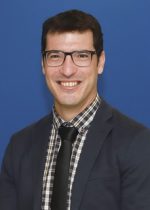גימון יואב, ד"ר

Background
Undergraduate and Graduate Studies
Bachelor of Physical Therapy – Ben-Gurion University of the Negev, Department of Physical Therapy – 2005-2008
Master of Medical Sciences – Ben-Gurion University of the Negev, Department of Physical Therapy – 2009-2011
Ph.D in Medical Sciences – Ben-Gurion University of the Negev, Department of Medical Sciences – 2011-2015
Post-Doctoral Studies
Johns Hopkins University School of Medicine. Laboratory of Vestibular NeuroAdaptation, Division of Hearing and Balance, Department of Otolaryngology Head and Neck Surgery (P.I- Prof. Michael C. Schubert) – 2016-2018
Publications
Research
My research examines vestibular neuroadaptation and the effects of novel vestibular rehabilitation methods on basic vestibular physiology and human function. My interest in this area of research is motivated by my desire to better understand how two patients, sharing the same pathology by definition, may demonstrate very different functional abilities. This behavioral-functional gap, which is not fully understood, is likely the result of disparities in vestibular afferents. These disparities appear to be amplified by central vestibular adaptation and perception mechanisms that are, themselves, not yet adequately studied. The goal of my research is to contribute to existing scholarship regarding of the processes within possible neuro-adaptation mechanisms that lead to differentiation in motor learning and motor behavior. To better understand the peripheral neurophysiology as well as central processing during motor learning, and its effect on recovery and the functional ability of the individual. An interesting phenomenon that cuts across results of all different vestibular interventions studies I have conducted, so far, is that the physiological improvements are relatively small whereas the clinical/functional improvements are substantial. This difference suggests the need to better understand the brain mechanisms that lead to this pronounced physiological-behavioral-functional gap and how to make it even better. My research centers on this gap and seeks to address it in a comprehensive manner, from vestibular physiology aspects, neurophysiological perspective, and clinical perspective.

